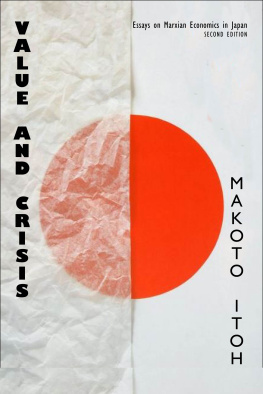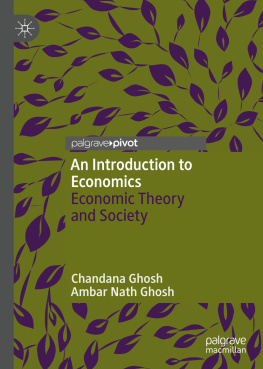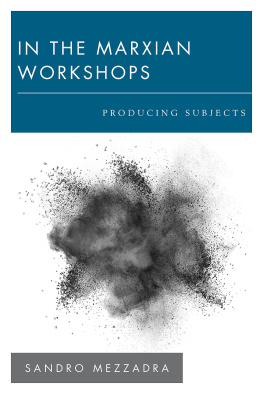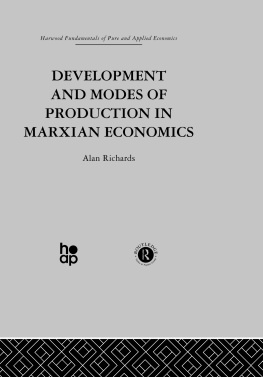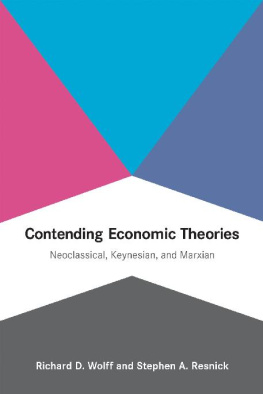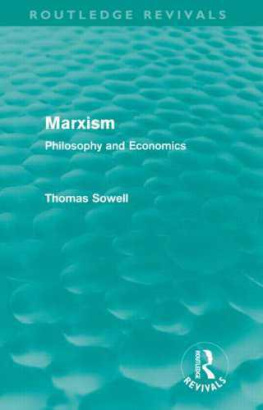Makoto Itoh - Value and Crisis: Essays on Marxian Economics in Japan
Here you can read online Makoto Itoh - Value and Crisis: Essays on Marxian Economics in Japan full text of the book (entire story) in english for free. Download pdf and epub, get meaning, cover and reviews about this ebook. year: 2020, publisher: NYU Press, genre: Politics. Description of the work, (preface) as well as reviews are available. Best literature library LitArk.com created for fans of good reading and offers a wide selection of genres:
Romance novel
Science fiction
Adventure
Detective
Science
History
Home and family
Prose
Art
Politics
Computer
Non-fiction
Religion
Business
Children
Humor
Choose a favorite category and find really read worthwhile books. Enjoy immersion in the world of imagination, feel the emotions of the characters or learn something new for yourself, make an fascinating discovery.
- Book:Value and Crisis: Essays on Marxian Economics in Japan
- Author:
- Publisher:NYU Press
- Genre:
- Year:2020
- Rating:3 / 5
- Favourites:Add to favourites
- Your mark:
- 60
- 1
- 2
- 3
- 4
- 5
Value and Crisis: Essays on Marxian Economics in Japan: summary, description and annotation
We offer to read an annotation, description, summary or preface (depends on what the author of the book "Value and Crisis: Essays on Marxian Economics in Japan" wrote himself). If you haven't found the necessary information about the book — write in the comments, we will try to find it.
Value and Crisis: Essays on Marxian Economics in Japan — read online for free the complete book (whole text) full work
Below is the text of the book, divided by pages. System saving the place of the last page read, allows you to conveniently read the book "Value and Crisis: Essays on Marxian Economics in Japan" online for free, without having to search again every time where you left off. Put a bookmark, and you can go to the page where you finished reading at any time.
Font size:
Interval:
Bookmark:

VALUE AND CRISIS
SECOND EDITION
VALUE AND CRISIS
Essays on Marxian Economics in Japan
Makoto Itoh

Copyright 2021 by Makoto Itoh
All Rights Reserved
Library of Congress Cataloging-in-Publication data available from the publisher
ISBN paper: 978-158367-898-5
ISBN cloth: 978-158367-899-2
Typeset in Minion Pro and Bliss
MONTHLY REVIEW PRESS, NEW YORK
monthlyreview.org
5 4 3 2 1
Contents
Preface and Acknowledgments to the First Edition
WORLD CAPITALISM IS SUFFERING [in the 1970s] from chronic and continuing crises of inflation and depression. Confidence in a better world through capitalist economic growth has been generally lost. Experiments to push forward first Keynesian and then monetarist policies within the framework of capitalism proved one after another ineffective, if not totally harmful, in ending the disastrous coexistence of higher rates of inflation and chronic depression. Neoclassical economics, including Keynesian theory, has failed to offer the systematic bases for understanding what was wrong, let alone provide a true remedy. Its failure constitutes an important portion of a more general disillusion with technical bourgeois social science. Such disillusion may be one of the sources of the reappearance of a fin de sicle unrest among younger generations in all capitalist societies. As our century draws to a close, an uneasy feeling of proceeding along a blind alley will intensify, reflecting the real situation of capitalist economy.
Needless to say, the gloomy situation caused by the capitalist impasse should not be equated with the dead end of human progress itself. It is not surprising that younger generations in both Western and third world countries have become increasingly interested in Marxism, attempting to find an alternative way out of the crisis in the future. Marxian economics can at least provide a sound basis for scientific studies of capitalism with all its historical specificities. Marxian theories of value and crisis, especially, unlike the neoclassicist theories of prices and economic growth, have a powerful potential in elucidating the historically limited features and the inner contradictions of capitalist economy.
Even though these theories do not supply a complete analysis of the current situation of capitalism directly, they can serve as scientific standards for empirical analyses. The more correct our understanding of these theories becomes, the less erroneous our understanding of the present world can be, avoiding too abstract, or too mechanical, or too fragmented approaches. In the long history of Marxism, however, the fertile ground of its basic theories has not been fully cultivated. For one thing, Marxs theories in Capital tended to be regarded by Marxians as too complete to be corrected anywhere, although Marx actually left us many important points to be finished up. Such a tendency was coupled with external anti-Marxian critiques, repeated without understanding the tasks and the contexts of Marxs theories. It was intensified also by the sterilization of theory under Stalinism, a development which might well be related to current problematic situations in the Soviet-type societies, as Paul Sweezy points out in a new book entitled Post-Revolutionary Society.
The development of Marxian economics in Japan, which dates back to the First World War, has been relatively immune from the fossilization of basic thought and theories. Even though the Soviet orthodoxy had a strong influence, rival schools of thought emerged and staged interesting debates as early as the interwar period concerning both the basic theories in Capital and the characteristics of Japanese capitalism as it developed after the Meiji Restoration of 1868. Since just after the Second World War, Japanese Marxian economics was allowed and able to revive in universities and has grown by both absorbing most of the important writings of foreign Marxists and by deepening domestic discussions. In particular, the growth of the Uno school, based on the late Kz Unos works, was conspicuous in activating debates and research. Uno believed that the relative autonomy of Marxian studies in the social sciences is important for strengthening the foundation of socialist assertions and that such studies should be free from political control or the cult of any individuals. As we read in his Principles of Political Economy, Uno attempted to purify Marxs original theory of value and crisis in rewriting the whole theoretical contents of Capital into a more consistent and concise logical system.
When I first visited England and the United States in 1974 and began to communicate with Western Marxists and students, I soon realized the need for and the importance of introducing Japanese contributions to Marxian economics to the Western world. These contributions could be quite useful in broadening and deepening the scope of Western studies, both methodologically and theoretically. However, a mere introduction of ready-made Japanese achievements did not seem sufficient in some aspects. Evolution of my own research seemed necessary in order to clarify the relevance of Japanese contributions to the recent Western debates. Apart from my contributions to crisis theory, which were already published in Japanese by 1973 and are partly summarized in itself), I hope that my challenges in these pages will add to the sound growth of Marxian studies both in Japan and in the rest of the world.
In writing the essays collected in this volume, my debts to a number of Japanese Marxian forerunners and colleagues are obvious. In addition, these essays could not be written without encouragement and generous assistance from a large number of friends in England and the United States. Meghnad Desai was the first who urged me to write an essay in English on Marxs crisis theory () was written in collaboration with Nobuharu Yokokawa and was edited by Sue Himmelweit and Diane Elson for Elsons collection entitled Value: The Representation of Labour in Capitalism. I want to thank all of these people for their help in making this book. I am also grateful to the publications mentioned for allowing me to reproduce the essays herein.
Many lectures and seminars I have given in England, the United States, Canada, and Europe, not to mention Japan, were encouraging for the birth of this book. I was particularly impressed among others by the number of reactions based on experiences similar to the controversy over Japanese capitalism (see the first essay), especially in the third world. My acknowledgments should be extended to the earnest students and other participants in such lectures and seminars as well as to the colleagues who organized those occasions. Finally, I am indebted to both Pete Burgess in London for editorial help and Karen Judd at Monthly Review Press for careful copyediting and handling of production.
Though I am surely responsible for whatever imperfections this volume may contain, I can scarcely feel this as my individual product. If the publication, like the birth itself, of this book helps to promote further international cooperation and communication between Japan and the rest of the world in the field of Marxian social science, I shall consider it a fortunate and useful contribution.
LONDON, AUGUST 1980
Introduction to the Second Edition
FORTY YEARS HAVE PASSED since the first edition of this book, Value and Crisis was published. Fortunately, the book was broadly read and internationally accepted, as exemplified by publication of translations into Dutch (1983), French (1987), Korean (1988), and Chinese (1990). It is also the books honor to have first-rate scholars such as Henk Plasmeijer, Claude Meillassoux, and Soo-Hen Kim as translators. It is not uncommon to meet young political economists from various countries who remember reading the book, even at recent conferences.
Next pageFont size:
Interval:
Bookmark:
Similar books «Value and Crisis: Essays on Marxian Economics in Japan»
Look at similar books to Value and Crisis: Essays on Marxian Economics in Japan. We have selected literature similar in name and meaning in the hope of providing readers with more options to find new, interesting, not yet read works.
Discussion, reviews of the book Value and Crisis: Essays on Marxian Economics in Japan and just readers' own opinions. Leave your comments, write what you think about the work, its meaning or the main characters. Specify what exactly you liked and what you didn't like, and why you think so.

